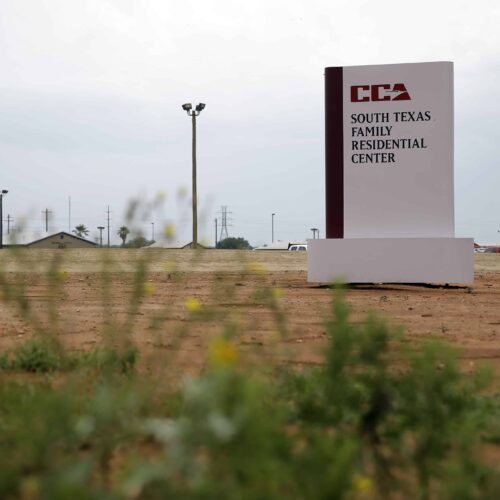Introduction
Update, March 4, 6:24 p.m.: The American Immigration Council announced on March 4 that 15 infants had been released from the South Texas Family Residential Center and that two infants and their parents remain.
A privately-run Texas detention center has been holding 17 mothers with babies, including a 5-month-old, who have allegedly lost weight and aren’t sleeping or feeding properly because of abrupt changes in the availability of formula, according to a new complaint filed by three immigrant advocacy groups.
The South Texas Family Residential Center in Dilley, Texas, is the largest family detention center in America, with capacity for 2,400 people. The private prison company CoreCivic operates the facility under contract with U.S. Immigration and Customs Enforcement, or ICE. The letter of complaint — from the American Immigration Council, the American Immigration Lawyers Association, and the Catholic Legal Immigration Network — alleges that the number of infants held at the Dilley center is increasing at an “alarming” rate and that the institution has a troubling history of inadequate care.
“We have grave concerns about the lack of specialized medical care available in Dilley for this vulnerable population,” the complaint says. “Infants are especially vulnerable to serious illnesses, pain, disability, and even death from preventable infections and diseases.”
The complaint notes that pediatricians advise against abrupt changes in formula routines, a process that should be gradual and monitored by a doctor. The complaint also points out that the Dilley center is more than an hour away by car from San Antonio, “the nearest metropolitan center with facilities equipped to provide specialized medical services.”
The complaint was sent to the U.S. Department of Homeland Security’s civil rights staff and the department’s Office of the Inspector General.
The advocacy groups are urging officials to release the infants and their mothers, all of them Hondurans, from the South Texas facility, so they can fight their asylum cases outside of detention. As of Feb. 28, one mother and her baby had been detained at the center for more than 20 days.
“Very young infants should not be held in detention centers,” Kathryn Shepherd, the American Immigration Council’s national advocacy counsel, told the Center for Public Integrity. Until recently, Shepherd added, it was very rare for babies under a year old to be held in detention.
In a document attached to the Feb. 28 complaint, Physicians for Human Rights experts described instances of alleged neglect uncovered in a variety of detention facilities. The Department of Homeland Security’s own health experts, the document says, identified a 16-month-old baby who’d lost a third of his body weight over 10 days because of diarrheal disease and an infant just 27 days old who was not examined by a physician until he had a seizure.
Shepherd said the Honduran mothers with infants detained at Dilley presented themselves to U.S. Customs and Border Protection officers at the U.S.-Mexico border and asked to apply for asylum. Shepherd said that the mothers have family in the United States with whom they could live while waiting to present their asylum claim to a judge.
Last year, an 18-month-old girl who had been held at the Dilley facility died after her release. The child and her Guatemalan mother were taken into custody at the border and placed at the Dilley center, where the toddler developed a cough and fever. The child received treatment and was eventually released with her mother. But six weeks later, the child died of viral pneumonitis.
The advocacy groups that filed the recent complaint argued that “ICE has failed to demonstrate its ability to provide regular preventive care which could detect potentially serious complications that could arise while in detention.”
The letter also includes references to a different complaint that immigrant-rights advocates filed in 2015 alleging that Dilley staff had administered vaccinations inappropriately to detainees, and failed to appropriately respond to detainees suffering from broken bones, diarrhea and other health problems. Following a second complaint, alleging more cases of neglect, the inspector general’s office launched an investigation into ICE’s family detention facilities but found no major violations.
Amanda Gilchrist, CoreCivic’s director of public affairs, said in an email to the Center that the company would defer to a statement issued by ICE, and declined to comment further.
ICE’s statement in response to the complaint says that “As the number of family units crossing the border into the U.S., has increased, so too has the frequency of those with younger children…” As a result, the letter said, “ICE is seeing an uptick in the number of family units with infants at its family residential centers.”
ICE noted that, as of Friday, a total of 17 children under a year old have been held at Dilley.
But the ICE statement says the agency insures that “comprehensive medical care is provided to all individuals in ICE custody” and that “staffing includes registered nurses and licensed practical nurses, licensed mental health providers, mid-level providers that include a physician’s assistant and nurse practitioner, a physician, dental care, and access to 24-hour emergency care.”
The agency spends “more than $250M annually on the spectrum of health care services provided to those in our care,” the statement added. A June 2017 report by the Department of Homeland Security’s Inspector General, found that family residential detention centers were “addressing the inherent challenges of providing medical care and language services and ensuring the safety of families in detention.”
Last year, as detention of families increased along the border, physicians expressed concerns about detention conditions, and argued against a new Trump Administration policy of separating migrant children from parents. The policy was developed so that all adult border crossers could be held in adult detention pending appearances in court on illegal-entry charges. The Center for Public Integrity reported on allegations that babies still breastfeeding were taken from mothers and placed in separate shelters.
Read more in Inequality, Opportunity and Poverty
Immigration Decoded
‘Third country’ deal sends migrants back to the countries they’re fleeing
Critics say new deportation deals with Central American countries violate U.S. asylum laws and will lead to more deaths.
Immigration Decoded
Rhetoric attacking immigrants has been on constant boil for years
Commentary: The El Paso shooter’s alleged anti-Hispanic screed echoes Trump and some media rhetoric.


Join the conversation
Show Comments